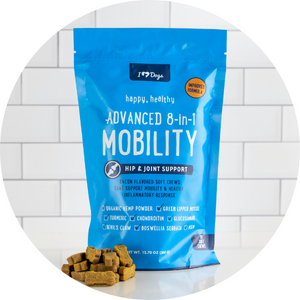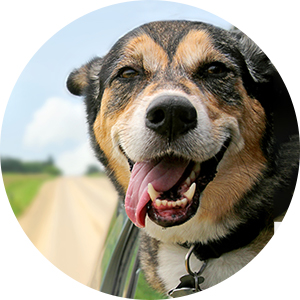Overweight Shih Tzus are prone to many health issues, even some that can lead to an early death. Being overweight puts stress on their joints and internal organs, including their heart. It increases the risk of many health issues including many forms of cancers, diabetes, heart disease, hypertension, osteoarthritis, and urinary bladder stones. So, to help keep your pup as healthy as possible, it’s good to watch and make sure yours is not getting too pudgy. The following are three signs that your Shih Tzu is overweight.
How Much Should Shih Tzu Weigh?
9 to 16 Lbs
#1 – No Definition
Looking at your dog’s body shape is a quick way to tell if they are getting to fat. If you keep your Shih Tzu’s hair long, be sure to push into the fur to feel their actual body lines, or check them out when wet from a bath. Shih Tzus are one of the few breeds that do not have a “tuck up” from the rib cage to the loins. However, they should still have definition. You should be able to feel a rib or two easily under that coat (not all the ribs!). And while they have a semi-deep rib cage, it should not be rounded. Dr. Sophia Yin’s website has a great, easy to follow guide for checking this.
#2 – Unable To Reach That Itch
Does your Shih Tzu try to scratch her ear and just can’t reach? Maybe she has no chance of reaching around to bite herself on her side or back. She should be able to groom herself without a struggle. If they are overly round, grooming becomes impossible. If that’s the case, then it’s time to diet.
#3 – Easily Overexerted
Do you walk a few steps and your Shih Tzu is already panting and wanting to stop? Barring hot weather or any pre-existing breathing issues due to their face shape, this is a sign that he is out of shape and probably overweight. It’s time to talk to the vet about a diet and exercise regimen that will slowly get him back on track. Be careful about pushing your Shih Tzu to exercise more than their body or respiratory system can handle – that can cause other issues.
Frequently Ask Questions
Because of their thick mane, Shih Tzus have been referred to as “Lion Dogs” for centuries. All of the different coats require a ton of maintenance and may obscure your dog’s weight. Learn how to determine if your tiny dog has a weight problem or if they are healthy and being fed the right amount of food for their stature.
Is My Shih Tzu Fat?
Despite the fact that all Shih Tzu appear to have the same anatomy, the majority of people are unable to tell the difference between a normal and an overweight Shih Tzu. Because of their thick coats, Shih Tzus may be difficult to recognize at first glance if their bellies are protruding more than they should.
This emphasizes the significance of frequent physical examinations of Shih Tzus by their owners. If you run your hands along the back of a Shih Tzu, you should be able to readily feel the ribs. If you cannot feel their ribs, it is safe to assume the dog is overweight. But the ribs should not be protruding, either. If so, the Shih Tzu might benefit from a pound or two of weight growth.
Like other breeds of dogs, Shih Tzus require the freedom to move about to fulfill needs like scratching that are intrinsic to their physiology. Typical dog activities, such as scratching and leaping up on furniture, may be difficult for overweight Shih Tzus. Also, as small and compact puppers, even a minor increase in weight can make life much more challenging for them.
Extreme obesity places extra strain on a dog’s vital organs. As a result, the effort required to do daily tasks and exercise increases. The fact that Shih Tzus are brachycephalic puts them at a severe disadvantage. Finally, Shih Tzu tends to pant after moderate exertion. If a Shih Tzu starts to fatigue during walks too quickly or too often, it is a sign that it is not getting enough exercise.
Shih Tzu Weight & Size Chart By Age
| Puppy Age | Estimated Weight |
| Birth | Less than 1 pound |
| 4 weeks | 1.25 pounds |
| 8 weeks | 2 – 2.5 pounds |
| 3 months | 4 pounds |
| 4 months | 6 pounds |
| 5 months | 8 pounds |
| 6 months | 10 pounds |
| 7 months | 12 pounds |
| 8 months | 12.5 pounds |
| 9 months | 12.5 pounds |
| 10 months | 12.5 pounds |
| 11 months | 12.5 pounds |
| 12 months | 12.5 pounds |
How Much Does The Average Shih Tzu Weigh?
When fully grown, Shih Tzu dogs can weigh anything from 7–8 pounds on the small end to 20 pounds or more on the large end. However, show dogs tend to weigh more and have constant monitoring too.
How Can I Help My Overweight Shih Tzu?
It takes more than just changing a dog’s diet to get them back to its ideal weight. Once the right changes are made, overweight dogs quickly lose the weight. Begin by decreasing their caloric intake and increasing their physical activity levels.
Before making any changes to their diet or exercise, you should take your Shih Tzu to the vet to rule out any underlying health problems like hypothyroidism or diabetes. Next, focus on the quality of food instead of the quantity choosing food high in protein and not in carbs or filler ingredients. Wet food can help hydrate your dog and give them a protein-rich meal that is easier on their digestive tract.
According to popular belief, pets tend to take on the owner’s physical traits, including their appearance and even their height. It is hardly shocking that dog weight problems have increased alongside human ones. If a Shih Tzu’s owner is overweight due to a sedentary lifestyle, the dog will likely share its owner’s weight and lead a similarly sedentary existence. The only way for a Shih Tzu to maintain an active lifestyle is if you, the owner is also active.
Treats should not be added to the daily quota but rather deducted. Stop feeding your dog scraps from the table if you want to ensure it gets enough food. In most cases, vegetables pose no danger to pets. Never allow them to eat as much as they want out of the bowl; instead, take it away after thirty minutes.
Lastly, use of non-food reinforcement as a last resort is recommended. If you pay them more attention, rub their bellies, and play with them, you may be able to strengthen your relationship with them without turning to treats. Increase the frequency of your dog’s walks and extend them to 20 minutes at least once a day.
What Is The Ideal Healthy Weight For A Shih Tzu?
According to the AKC’s breed standards, an adult Shih Tzu should be between 9 and 16 pounds and 9 to 10.5 inches in height. In its adult form, the ideal Shih Tzu will have a tail that curls over its back, giving it the appearance of being longer than tall. Remember, it is tough to detect if a Shih Tzu is gaining weight due to its thick double coat. To keep a closer watch on your Shih Tzu’s weight, take them for regular check up and feel their body beneath their coat frequently.
How Much Should A Shih Tzu Eat A Day?
The vast majority of Shih Tzu pups should only eat between half a cup to an entire cup’s worth of food daily. Due to the fact that this is such a small amount, it may be difficult for us humans to comprehend the fact that this is all a small dog needs. The same can be said about adult Shih Tzu, who, on a daily basis, takes anywhere from three-quarters to two cups of food on average.
Are Shih Tzu Prone To Obesity?
No, Shih Tzus are one of the breeds not prone toward obesity, a list that also includes German Shepherds and Yorkshire terriers. Even though there is a possibility that these dogs will still end up being overweight, the likelihood of this occurring is far smaller in contrast to that of other types of dogs.
How Do I Know If My Shih Tzu Is Too Fat?
Place your four-legged friend in a standing stance and move your hands over their sides while you pet them. Your dog has an unhealthy amount of body fat if you cannot feel his or her ribs or if you can only do so with great effort. An underweight dog can be identified by the presence of an excessive amount of ribs and a small amount of space between the skin of the dog and its ribs. Check with your vet if you have any issues either way.
How Do I Get My Shih Tzu To Gain Weight?
When trying to gain weight, it is best to feed your dog foods high in protein and fat. If you feed your dog a diet that is higher in fat and protein, it will be much simpler for your dog to gradually put on weight over the course of time. You should see a difference in a few weeks with more fat and protein.
However, do not feed your Shih Tzu more food long term, nor should you feed them cheap filler food as it’s unhealthy. Do not give your dog human food with more than one ingredient. For example, giving your dog carrots or chicken is safe, but do not give your pet pasta or granola bars. This will allow your dog to put on weight in a manner that is not only controllable but also healthy.
In addition, if he needs some aid in taking in more calories, a decent supplement that is heavy in calories can work exceptionally well for him. This is because calories are the units of energy that our bodies use to fuel our daily activities. A healthy dog needs both quality food and exercise.
What Should The Max Weight Of A Shih Tzu Be?
Your Shih Tzu’s weight is important as a healthy weight can increase life expectancy. The average female should weigh between 11.5 and 17.6 pounds for females, and the average male weighs between 11.9 and 17.6 pounds.
Overweight Breed Informational Pages
- Is My Bulldog Overweight Or Obese?
- Is My Chihuahua Overweight Or Obese?
- Is My Corgi Overweight Or Obese?
- Is My Dachshund Overweight Or Obese?
- Is My Doberman Overweight Or Obese?
- Is My German Shepherd Overweight Or Obese?
- Is My King Charles Spaniel Overweight Or Obese?
- Is My Lab Overweight Or Obese?
- Is My Maltese Overweight Or Obese?
- Is My Pit Bull Overweight Or Obese?
- Is My Pomeranian Overweight Or Obese?
- Is My Rottweiler Overweight Or Obese?
- Is My Shih Tzu Overweight Or Obese?
- Best Joint Supplement for Dogs
- Best CBD Gummies for Dogs
- Goat's Milk for Dogs
- Skin & Coat Supplements for Dogs
- Weight Gain Supplements for Dogs
- Muscle Building Supplements for Dogs
- Heart Supplements for Dogs
- Multivitamins for Dogs
- Pill Pockets for Dogs
- Digestive Enzymes for Dogs
- Turmeric for Dogs
- Liver Supplements for Dogs
- Tear Stain Supplement for Dogs
- Breath Fresheners for Dogs
- Kidney, Urinary, & Bladder Supplements for Dogs
- Stool Eating Deterrent for Dogs
- Eye Supplements for Dogs
- Melatonin for Dogs
- Apple Cider Vinegar for Dogs
- Green Lipped Mussels for Dogs
- L Theanine for Dogs
- Chondroitin Supplements for Dogs
- MSM for Dogs
- Valerian Root for Dogs
- Chamomile for Dogs
- Boswellia for Dogs
- L Tryptophan for Dogs
- Yucca for Dogs
- Licorice Root for Dogs
- Bromelain for Dogs
- Papain for Dogs
- Devil's Claw for Dogs
- Quercetin for Dogs
- Hemp gummy for dogs
- Best Hemp Dog Treats
- Best Hemp Oil for Dogs
- Best Calming Treats, Chews, & Supplements for Dogs
- Best Bone Broth for Dogs
- Best Fish Oil for Dogs
- Best Probiotics for Dogs
- Best Hip Dysplasia Supplements for Dogs
- Best Colostrum for Dogs
- Best Quercetin for Dogs
- Best Greens for Dogs Supplements
- Best Vitamin C Supplements for Dogs
- Best Probiotic for Dog with Allergies
- Best Taurine Supplements for Dogs
- Best Dog Food Toppers
- Best Anal Gland Supplement for Dogs
- Best Dog Probiotic Powder
- Best CoQ10 Supplement for Dogs
- Best Liquid Glucosamine for Dogs
- Best Wrinkle Creams, Balms, and Wipes for Dogs
- Best Puppy Calming Treats
- Best Colloidal Silver for Dogs
- Best Adaptogen Supplements for Dogs
- Best Cognitive Supplements for Dogs
- Best Bee Pollen for Dogs
- Best Vitamin A Supplements for Dogs
- Best Vitamin E Supplements for
- Best Liquid Glucosamine Supplements for Dogs
- Best SAM-e Supplements for Dogs
- Best Hyaluronic Acid Supplements for Dogs
- Best Apple Cider Vinegar Supplements for Dogs
- Best Diarrhea Medicine for Dogs
- Best Milk Thistle for Dogs
- Best Turkey Tail Mushroom Supplements for Dogs
- Best Astaxanthin Supplements for Dogs
- Best Lutein Supplements for Dogs
- Best Electrolyte Supplements for Dogs
- Best Coconut Oil for Dogs
- Best Prenatal Vitamins for Dogs
- Best Puppy Milk Replacements
- Best Iron Supplements for Dogs
- Best Dewormer Products for Dogs
- Best Mange Medications for Dogs
- Best Cough Relief Products for Dogs
- Best Sinus Relief Products for Dogs
- Best Collapsed Trachea Supplements for Dogs
- Best Fireworks Anxiety Relief Products for Dogs
- Best Thunderstorm Anxiety Relief Products for Dogs
- Best Travel Anxiety Relief Product for Dogs
- Best Supplements for a Dog with a Torn ACL
- Best Supplements for a Dog with Patellar Luxation
- Best Supplements for a Dog with Intervertebral Disc Disease
- Best Zinc Supplements for Dogs
- Best Biotin Supplements for Dogs
- Best Tart Cherry Supplements for Dogs
- Best Resveratrol Supplements for Dogs
- Best Ginkgo Biloba Supplements for Dogs
- Best Ashwagandha Supplements for Dogs
- Best Supplements for Dogs with Cushing's Disease
- Best Adrenal Supplements for Dogs
- Best NAD+ Supplements for Dogs
- Best NMN Supplements for Dogs
- Best Supplements for Dogs with Dementia
- Best Supplements for Dogs with CCD(Canine Cognitive Dysfunction)
- Best Fiber Supplements for Dogs
- Best Spirulina for Dogs
- Best Hairball Remedies for Dogs
- Best Eye Drops for Dogs with Allergies
- Best Magnesium Supplements for Dogs
- Best Brushes for Double-Coated Dogs
- Best Dandelion Root Supplements for Dogs
- Best Probiotic for Dogs with Yeast Infections
- Best Flaxseed Oil for Dogs
- Best Chamomile Supplements for Dogs
- Best Lavender Supplements. Treats & Sprays for Dogs
- Best Collagen Supplements for Dogs
- Best Kelp Supplements for Dogs
- Best Activated Charcoal for Dogs
- Best Slippery Elm Supplements for Dogs
- Best Supplements for Dogs with Seizures & Epilepsy
- Best Antioxidant Supplements for Dogs
- Best Ubiquinol Supplements for Dogs
- Best Hormone & Glandular Supplements for Dogs
- Best Thyroid Supplements for Dogs
- Best Iodine Supplements for Dogs
- Best Dog Shedding Supplements for Dogs
- Best Detox Supplements for Dogs
- Best Postbiotics for Dogs
- Best Aspirin Products for Dogs
- Best Dog Anti-Nausea Products
- Best Dog Mouthwashes
- Best Camelina Oils for Dogs
- Best Hemp Seed Oils for Dogs
- Best Natural Anti-Inflammatories for Dogs
- Best Cancer Supplements for Dogs
- Best Sardine & Anchovy Oils for Dogs
- Best Fatty Acid Supplements for Dogs
- Best Chia Seed Supplements & Treats for Dogs
- Best Olive Oils for Dogs
- Best Amino Acid Supplements for Dogs
- Best Moringa Supplements for Dogs
- Best Echinacea Supplements for Dogs
- Best Cranberry Supplements for Dogs
- Best D-Mannose Supplements for Dogs
- Best Nettle Leaf Supplements for Dogs
- Best Marshmallow Root Supplements for Dogs
- Best Astragalus Supplements for Dogs
- Best Pumpkin Seed Supplement for Dogs
- Best Supplements for a Dog Wetting The Bed
- Best Blueberry Supplement for Dogs
- Best Bromelain Supplements for Dogs
- Best Yucca Supplements for Dogs
- Best Ginger Supplements for Dogs
- Best Rosehip Supplements for Dogs
- Best Allergy Medicines for Dogs
- Best Reishi Mushroom Supplement for Dogs
- Best Maitake Mushroom Supplement for Dogs
- Best Chaga Mushroom Supplement for Dogs
- Best Shiitake Mushroom Supplement for Dogs
- Best Cordyceps Mushroom Supplement for Dogs
- Best Lion's Maine Supplement for Dogs
- Have question? - Ask in our Dog Health Forum







 Toledo, United States.
Toledo, United States.